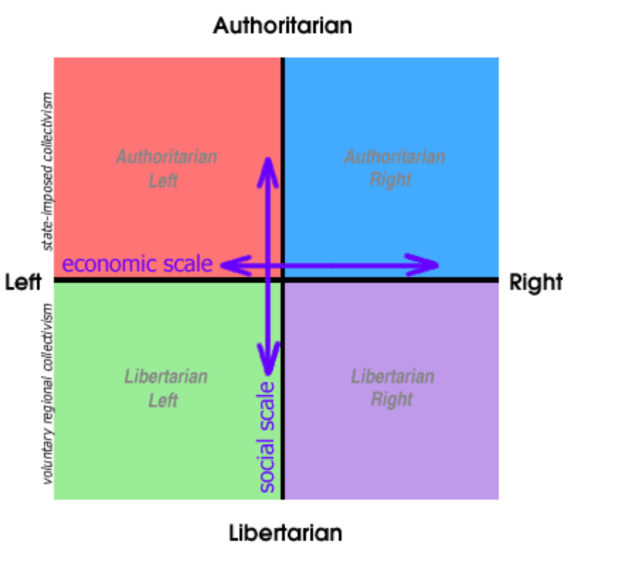This is an opinion editorial by Dea Rezkitha, an Indonesian Bitcoin educator and podcast host.
In politics, individuals are often grouped into “left” and “right” wings, but the complexities go well beyond this simple dichotomy. To gain a deeper understanding of people’s beliefs and values, and ultimately how these will inform their outlook on Bitcoin, it is crucial to consider their social views as well. This is where a political compass comes into play, serving as a valuable tool for analysis.
What Is A Political Compass?
The political compass is a graphical representation of political ideologies that helps categorize individuals or groups based on their views on two main axes: economic policy (left-right) and social policy (authoritarian-libertarian). It provides a more nuanced understanding of political ideologies beyond the traditional left-right spectrum.
You can easily take the political compass test at this link.

The political compass allows for a more comprehensive understanding of political ideologies by incorporating both economic and social dimensions. It recognizes that political views cannot be easily reduced to a simple left-right spectrum and acknowledges the varying degrees of government intervention and social control that different ideologies advocate for.
The left-right axis reflects a spectrum of economic policy preferences. On the left side, you find ideologies that generally advocate for greater government intervention in the economy and more equitable distribution of wealth and resources. These ideologies may support policies such as progressive taxation, social welfare programs and government regulation of industries. They often prioritize social justice and reducing inequality.
On the right side, you find ideologies that favor less government intervention in the economy and emphasize individual freedom and free markets. These ideologies tend to support lower taxes, limited government regulation and free trade. They believe that economic prosperity is best achieved through minimal government interference and individual initiative.
The authoritarian-libertarian axis represents social policy preferences and the degree of government control over personal freedoms. Authoritarian ideologies advocate for a strong central authority that exercises control over various aspects of society. They may support strict law enforcement, censorship and limitations on individual rights in the name of maintaining social order and stability.
Libertarian ideologies, on the other hand, emphasize individual liberty and limited government intrusion into personal matters. They prioritize individual rights, civil liberties and freedom of choice. They advocate for a smaller role of government and believe that individuals should have the freedom to make their own decisions without unnecessary interference.
How Different Political Views Inform Understanding Of Bitcoin
By assessing someone’s position on the political compass, we can gain insight into their overall political outlook and where they stand on key issues related to economics and personal freedoms. This also affects how we understand Bitcoin based on the perspective of each spectrum. Let’s analyze them one by one.
Left-Authoritarian Bitcoiners
People with a left-authoritarian-leaning outlook prefer strong state authority and control over society. It represents a belief system where the government plays a significant role in both the economy and social affairs.
Left-authoritarians typically advocate for greater wealth redistribution, social welfare programs and government regulation of industries to address issues of inequality and social justice. They believe that a strong central authority is necessary to ensure economic equality and protect the rights of marginalized groups. Left-authoritarians may support progressive taxation, labor rights and government intervention in markets to promote economic stability and reduce disparities.
When it comes to social policy, they favor strict regulations and laws to maintain social order and advance their vision of a more equitable society. They often prioritize collective well-being over individual liberties and may endorse policies such as censorship, limitations on free speech and restrictions on personal freedoms in the interest of promoting social cohesion and harmony.
Left-authoritarian-leaning Bitcoin enthusiasts advocate for increased regulations surrounding Bitcoin. They harbor a skeptical view of Bitcoin, appreciating its technological advancements while expressing concerns about its potential impact on government taxation. Furthermore, they express worries about the energy consumption associated with Bitcoin. They also despise that Bitcoin can be used for criminal and terrorist activities. These individuals find Bitcoin Maximalists frustrating and urge them to adopt a more inclusive approach and align with the popular narrative.
Right-Authoritarian Bitcoiners
Right-authoritarians generally support free-market capitalism and limited government intervention in the economy. They advocate for policies such as lower taxes, deregulation and protection of private property rights. They believe that economic freedom and individual initiative are key to prosperity and societal well-being. Right-authoritarians often emphasize the importance of law and order, national security and maintaining traditional social hierarchies
In terms of social policy, right-authoritarians prioritize traditional values and cultural norms. They tend to oppose social changes that challenge traditional family structures, religious institutions or national identity.
A right-authoritarian Bitcoiner sees Bitcoin as a byproduct of a free market. They appreciate the technological advancements and capital gains that come with bitcoin. That’s why these individuals advocate for bitcoin as a personal savings or reserve.
They also acknowledge the potential for bitcoin to be used in money laundering and, therefore, handle bitcoin with caution, making efforts to comply with regulations such as paying capital gains taxes and adhering to know-your-customer (KYC) requirements for Bitcoin. For Muslim Bitcoiners within the right-authoritarian spectrum, there could be genuine concerns regarding whether Bitcoin is considered halal or haram.
Even though they do not entirely agree with central bank digital currencies (CBDCs), these Bitcoiners see CBDCs as an inevitable move and believe it can be helpful in providing financial access to more people.
Left-Libertarian Bitcoiners
Left-libertarians generally advocate for significant economic and social reforms to address inequalities and promote a more equitable distribution of wealth and resources. Left-libertarians believe that economic power should be decentralized and shared among individuals rather than concentrated in the hands of a few.
They advocate for the removal of laws and regulations that restrict individual choices and behaviors, as long as they do not harm others. They support issues such as human rights, freedom of speech and the right to privacy. Left-libertarians are critical of state control and interventions that infringe upon individual liberties.
A left-libertarian Bitcoiner sees Bitcoin as a tool to grant financial freedom to marginalized individuals. They are profoundly moved by stories showcasing how Bitcoin has been utilized by dissidents and even in war zones. They consistently remind us of the cases of Julian Assange and Ross Ulbricht, or quote George Orwell’s “1984” or “Animal Farm” books, using these examples to highlight why Bitcoin is necessary in the first place.
Left-libertarians prioritize utmost privacy, fearing that the State may eventually strip it away. They actively seek ways to obtain the most private form of bitcoin, and if they engage in mining, it is primarily to acquire bitcoin in a KYC-free way. They also pushed Bitcoin to be accepted as a global payment so that more people can be included in the economy.
Moreover, they hold a deep disdain for CBDCs and perceive them as a tool for State control over individuals. They express significant concerns about the potential correlation between CBDCs and social credit scores, similar to the system implemented in China. Left-libertarians regard this as a serious threat to personal freedoms and are vigilant in voicing their apprehensions about the encroachment of State power.
In summary, the left-libertarian Bitcoiner advocates for using Bitcoin as a means to grant financial autonomy, strongly emphasizes privacy rights, resists CBDCs and remains wary of State overreach and potential surveillance systems.
Right-Libertarian Bitcoiners
Right-libertarians advocate for minimal government interference in the economy, promoting free-market capitalism and laissez-faire principles. They believe that voluntary transactions and individual self interest are the most efficient means to allocate resources and promote economic growth. Right-libertarians argue for reduced regulations, lower taxes and limited government spending, viewing these policies as catalysts for entrepreneurship, innovation and prosperity.
In terms of social policy, right-libertarians prioritize individual rights and freedoms, advocating for the protection of civil liberties, free speech and personal privacy. They generally oppose government intervention in matters such as drug use, consensual adult activities and non-violent behaviors. Right-libertarians value personal responsibility and self-determination, arguing that individuals should have the freedom to make their own choices as long as they do not infringe upon the rights of others.
A right-libertarian Bitcoiner is enthusiastic about delving into Austrian economics literature. They firmly believe that Bitcoin represents the ultimate form of private property, immune to State interference. Many right-libertarians cherish their independence and prefer to be left alone. They enjoy weightlifting, follow a carnivorous diet and advocate for traditional family values.
These individuals are captivated by Bitcoin and eagerly explore various Lightning Network applications, always on the lookout for the latest innovations in the Bitcoin space. Some of them actively participate in trading or even establish their own Bitcoin-related businesses as alternative avenues to acquire more bitcoin.
Typically, these individuals prioritize their freedom of speech and are unafraid to express their views. They maintain a strong focus on investing in bitcoin with a long-term mindset, hoping that one day, their bitcoin holdings will generate wealth for their families.
They also despise CBDCs and surveillance cameras because they can be used as tools to strip away freedoms. Right-libertarians perceive CBDCs as a threat to the economy, as they bear the potential for hyperinflation and state control.
Centrist Bitcoiners
But what if your views lean neither left nor right? This would make you a “centrist.” Centrism is characterized by a moderate and pragmatic approach to politics, seeking to find a balance between competing interests and perspectives.
Centrists often emphasize the importance of practical solutions and compromise. They believe in considering a range of viewpoints, weighing evidence and making decisions based on what they perceive as the most effective and reasonable courses of action. Centrists typically reject extreme or rigid ideological positions, preferring a more flexible and nuanced approach. They are inclined to support policies that are based on evidence, effectiveness and the overall well-being of society.
A centrist Bitcoiner, whether positioned on the y axis (authoritarian-libertarian) or the x axis of the political compass, takes a pragmatic approach to Bitcoin. They do not discount the fact that accumulating bitcoin can be a means to personal enrichment and is also important for personal freedom. However, they also recognize the importance of the fiat system as it undergirds the currencies that people currently use.
Sometimes, other Bitcoiners perceive centrist Bitcoiners as opportunistic or confusing because they tend to navigate both sides of the spectrum. They may express skepticism towards cryptocurrencies on one occasion while being supportive of them on another. Similarly, they might hold both anti-government and pro-government regulation views. For centrists, their stance depends on the specific context of each situation. These Bitcoiners always try to appease extreme opinions from different spectrums and sometimes enjoy playing the devil’s advocate.
Respect For Nuance
It is foolish to label Bitcoiners solely as “libertards” or “maxis” because, based on this breakdown, there are nuanced differences among them all.
There are no right or wrong views, and no group holds superiority over others. This analysis serves to illustrate that everyone possesses unique perspectives, and this diversity will always be a dynamic characteristic of the world, particularly within the Bitcoin space.
This is a guest post by Dea Rezkitha. Opinions expressed are entirely their own and do not necessarily reflect those of BTC Inc or Bitcoin Magazine.



